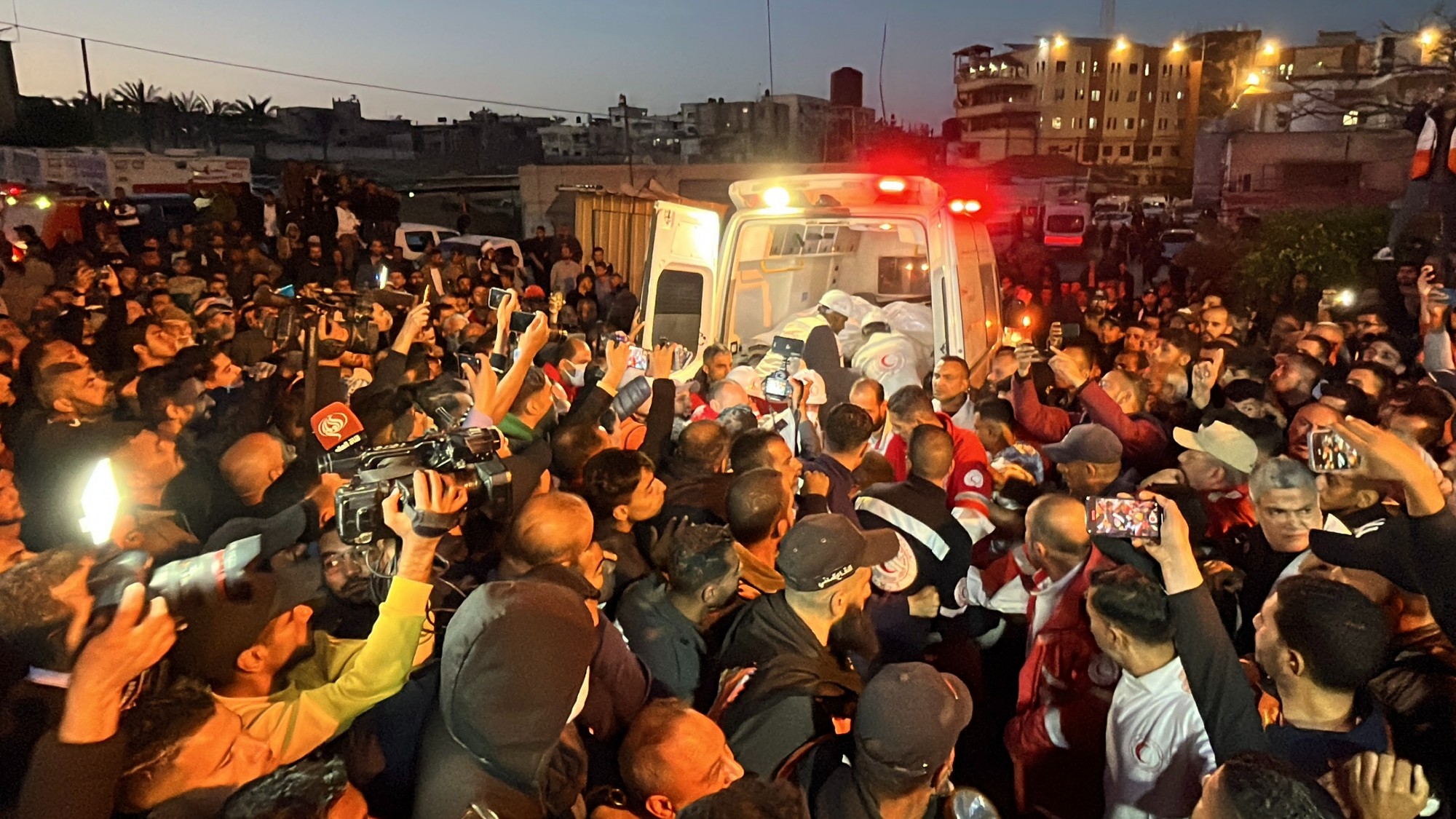Gaza: the killing of the paramedics
IDF attack on ambulance convoy a reminder that it is 'still possible to be shocked by events in Gaza'

A free daily email with the biggest news stories of the day – and the best features from TheWeek.com
You are now subscribed
Your newsletter sign-up was successful
"After 18 months of slaughter, it is still possible to be shocked by events in Gaza," said The Guardian. More than 50,800 Palestinians have been killed, according to the Hamas-run health authority. Israel's offensive has intensified again, and at least 100 children have been killed or maimed each day since strikes resumed last month. Even so, the killing of 15 Palestinian paramedics and rescue workers last month is "particularly chilling".
In the early morning of 23 March, the Palestine Red Crescent sent ambulances just north of the city of Rafah to evacuate wounded civilians; there, the convoy came under fire from Israel Defence Forces (IDF). On 30 March, 15 bodies were retrieved from a mass grave; their ambulances and vehicles had also been crushed and buried in sand. Some of the bodies had their hands and legs tied. Preliminary evidence suggests they were shot from close range: executed. Killing civilians is of course a crime; in theory, medics have additional protections. But in Benjamin Netanyahu's Israel, international law is flouted every day. "In an age where impunity flourishes, crimes will multiply."
After the bodies were discovered, the IDF initially claimed that its soldiers had fired on a suspicious convoy that approached in the dark "without headlights or emergency signals", said Isabel Kershner in The New York Times. Military officials, though providing no evidence, also stated that nine (or later, six) of those killed were operatives of Hamas or Islamic Jihad. But a video recovered from the phone of one of the deceased men shows clearly that the ambulances and a fire truck had their lights on when they were ambushed by Israeli forces; and the UN insists that all the men were bona fide paramedics and rescue workers. The IDF has since "acknowledged flaws" in its initial account, and has promised to investigate.
The Week
Escape your echo chamber. Get the facts behind the news, plus analysis from multiple perspectives.

Sign up for The Week's Free Newsletters
From our morning news briefing to a weekly Good News Newsletter, get the best of The Week delivered directly to your inbox.
From our morning news briefing to a weekly Good News Newsletter, get the best of The Week delivered directly to your inbox.
We should be wary of declaring Israel guilty before the facts are settled, said Jonathan Sacerdoti in The Spectator. Palestinian terror groups have in the past been accused of using ambulances as "instruments of war". And the convoy was passing through a war zone, where Hamas vehicles had recently been active. That's true, said The Jerusalem Post. And no doubt whatever happened took place in "the fog of war". But that the IDF has had to correct its initial version of events in the light of "damning" evidence provided by the media is "concerning". "Fighting in a war is not a blank cheque. There are still rules, there are still protocols." We must await the findings of the official inquiry; but all this is "not a good look for the IDF or Israel".
A free daily email with the biggest news stories of the day – and the best features from TheWeek.com
-
 6 of the world’s most accessible destinations
6 of the world’s most accessible destinationsThe Week Recommends Experience all of Berlin, Singapore and Sydney
-
 How the FCC’s ‘equal time’ rule works
How the FCC’s ‘equal time’ rule worksIn the Spotlight The law is at the heart of the Colbert-CBS conflict
-
 What is the endgame in the DHS shutdown?
What is the endgame in the DHS shutdown?Today’s Big Question Democrats want to rein in ICE’s immigration crackdown
-
 Corruption: The spy sheikh and the president
Corruption: The spy sheikh and the presidentFeature Trump is at the center of another scandal
-
 Putin’s shadow war
Putin’s shadow warFeature The Kremlin is waging a campaign of sabotage and subversion against Ukraine’s allies in the West
-
 The fall of the generals: China’s military purge
The fall of the generals: China’s military purgeIn the Spotlight Xi Jinping’s extraordinary removal of senior general proves that no-one is safe from anti-corruption drive that has investigated millions
-
 Syria’s Kurds: abandoned by their US ally
Syria’s Kurds: abandoned by their US allyTalking Point Ahmed al-Sharaa’s lightning offensive against Syrian Kurdistan belies his promise to respect the country’s ethnic minorities
-
 Israel retrieves final hostage’s body from Gaza
Israel retrieves final hostage’s body from GazaSpeed Read The 24-year-old police officer was killed during the initial Hamas attack
-
 Iran unleashes carnage on its own people
Iran unleashes carnage on its own peopleFeature Demonstrations began in late December as an economic protest
-
 How oil tankers have been weaponised
How oil tankers have been weaponisedThe Explainer The seizure of a Russian tanker in the Atlantic last week has drawn attention to the country’s clandestine shipping network
-
 The rise of the spymaster: a ‘tectonic shift’ in Ukraine’s politics
The rise of the spymaster: a ‘tectonic shift’ in Ukraine’s politicsIn the Spotlight President Zelenskyy’s new chief of staff, former head of military intelligence Kyrylo Budanov, is widely viewed as a potential successor